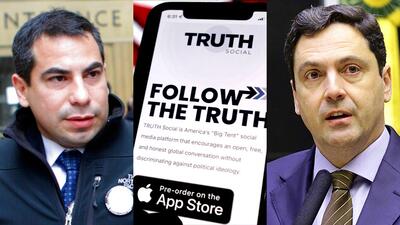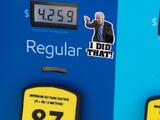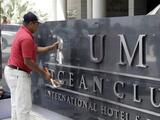Trump could face federal scrutiny over new social media venture, experts say

Donald Trump is no stranger to risk. But his recent decision to take his new social media venture public, has placed him in the hazardous territory of federal financial scrutiny.
Trump has spent most of his career making private financial deals, with mixed success, but always outside the stock market where federal regulation strictly protects investors in publicly-held companies.
Last month Trump announced he has entered into an agreement with a Peruvian-American banker in Miami, Patrick Orlando, to merge with a public company backed by a little-known Chinese investment firm.
Details that have emerged about the deal, including official documents filed with the Securities and Exchange Commission (SEC), the federal agency that regulates the stock markets, may reveal a lack transparency and could violate investor rules, according to the lawyers and industry experts.
Orlando had been discussing the merger deal with Trump well before it was announced, according to one source who told Univision that Orlando had pitched it to wealthy potential investors in Miami in the late summer. None chose to invest.
The New York Times also reported that Orlando and Trump met at the former president’s home, Mar-a-Lago, prior to the announced merger.
Red flag
That could be a major red flag, experts say, due to the financial regulations covering this type of merger.
Under the deal, Trump agreed to merge his social media venture, Trump Media & Technology Group, with what’s known as a special purpose acquisition company, or SPAC, a financial mechanism tool for launching public companies through what is known as ‘blank check’ financing.
Normally, public companies are successful businesses that have existed for some time under private ownership and seek to grow with an injection of cash from the stock markets. SPACs are empty shell companies that are allowed to raise money based upon the future acquisition or merger with an existing private company. This allows smaller companies to find investors, without going through the more traditional route of a more rigorous – and expensive – ‘initial public offering’ on the stock market, known as an IPO.
However, to prevent unfair insider trading, SPACs aren’t allowed to have a pre-arranged target company at the time they go public.
Documents filed with the SEC reveal that Orlando’s SPAC, Digital World Acquisition Corp (DWAC), originally was also planning to raise $100 million in May when the market for SPAC was running hot. It eventually was announced in early September at $300 million, despite a weakening in the market over the summer.
The DWAC also lists admirer of Trump, conservative Brazilian congressman, Luiz Philippe de Orleans e Bragança, as its chief financial officer.
"Surprising"
Industry experts question why Orlando’s SPAC suddenly became so popular with investors when the market for blank check companies had soured.
“It is surprising,” said Usha Rodrigues, a professor of corporate finance and securities law at the University of Georgia who has also studied SPACs.
“The amount of money varies according to the appetite in the market. The overall market was contracting at that time. There was a perception that there were too many SPACs out there already,” she added.
The cooling off was largely due to signals from the SEC earlier this year that it was looking at tightening the rules after a series of company collapses that raised questions about adequate protection for ordinary retail investors.
The SEC is looking “to tamp down what some perceived to be an over-exuberance in the SPAC market,” said Rodrigues.
The SEC’s job is to protect investors and “maintain fair, orderly and efficient markets … worthy of the public trust.” It also has an enforcement arm that can heavily scrutinize any deals that might shake confidence in the stock market, potentially undermining the health of the economy.
“If Orlando has had discussions with Trump about this that’s when it gets pretty dicey,” said Michael Stegemoller, a banking and finance professor at Baylor University, who has studied the evolution of SPACs.
No 'substantive discussions"
In the first line of its preliminary prospectus filed with the SEC on July 8, DWAC declared it had not selected a target company, “and we have not, nor has anyone on our behalf, initiated any substantive discussions, directly or indirectly, with any business combination target.”
It added that it intended “to focus on middle market and emerging growth technology-focused companies in the Americas,” including software, technology and financial services.
Lawyers and industry experts say Trump’s media venture, launched in February, does not appear to fit that description. “I don’t see how this applies to this firm at all,” said Stegemoller. “There just doesn’t appear to be any wiggle room,” he added.
It’s main offering is a social network, named ‘ Truth Social,’ designed “to stand up to the tyranny of Big Tech,” according to a press release.
THTG and Orlando declined to comment when contacted by Univision. “At this time, we are not accepting press questions or interviews,” a spokesperson for DWAC wrote via email.
On top of that, in the case of Trump’s new media company, little is known about its structure. Formed only a few months ago, it has not begun operations and its valuation is hard to measure beyond Trump’s potentially large audience. His ‘ Truth Social’ app is available for “pre-order” from the Apple app store and is due for a nationwide rollout in the first quarter of 2022.
"Disruptive event"
Buried in the SEC filing for the merger was also language that might trouble investors, referencing the need to structure the company’s ownership to protect it from a potential ‘Material Disruptive Event,’ including a political campaign or criminal problems.
The document lists such an event as: “(i) the Company Principal announces that he is running for a public office, or (ii) the Company Principal is personally convicted of a felony criminal offense.”
It is well known that New York prosecutors are currently investigating Trump's business dealings, in a case that has already resulted in tax fraud charges against Trump's company, the Trump Organization, and its longtime chief financial officer, Allen Weisselberg.
Trump is also a favorite among Republicans to run for president again in 2024.
Speedy deal
Stegemoller and others also questioned the speed with which this deal was announced.
The average time from the announcement of a SPAC to the selection of a target is more than 100 days, said Stegemoller.
In the case of DWAC, it took less than seven weeks from its registration with the SEC on Sept 2, to its announced merger with Trump’s venture on Oct 20. Industry experts have speculated that the speed of the transaction could also be an indication that the target had been pre-identified.
Considering the speed of the merger transaction and the lack of transparency, industry experts say the deal with Trump could be cause for concern at the SEC. “Some of this behavior could cause the SEC to take a harder look,” said Rodrigues.
Orlando, who was educated in the United States and has a degree from Massachusetts Institute of Technology (MIT) one of the country’s most prestigious universities, has been involved in several SPAC ventures, though he has yet to conclude an acquisition. SPACs have a time limit and must close a merger within two years of their formation. If they fails to do so the money raised is returned to investors.
He listed as CEO of Yunhong International another SPACs located in an office building in Wuhan, China, according to SEC filings.
A former Wall St trader, Orlando is largely unknown in Miami where he lives in a $1.4 million home near the bay. His business address is a WeWork office sharing space close to downtown Miami.
Little known
Industry experts have also questioned why Orlando chose a relatively small and little known investment bank, the U.S. subsidiary of a London-based wealth management company, Kingswood Group, as the underwriter for his SPAC, rather than one the big U.S. banks with more experience in financing ‘blank check’ companies.
U.S. banks are wary of SPACs with ties to Chinese investors because of concerns over the lack of transparency of China's financial system, which makes it difficult to meet the volume of disclosures demanded by U.S. regulators.
SEC regulators may also want to look at how the company’s official filings obscured the relationship between Orlando and his financial partners, including Abraham Cinta, a Mexican based in China who was sanctioned by the SEC in 2017 for lack of “integrity.”
The SEC filing names Orlando as the CEO of the Miami-based company managing the SPAC, ARC Global Investments II LLC. It also states: “There is no material litigation, arbitration or governmental proceeding currently pending against us or any members of our management team in their capacity as such.”
Only after the merger was announced did Orlando identify Cinta as his advisor.
Cinta did not respond to a request for comment.
Chinese company
Cinta is a managing partner of ARC Capital, a Shanghai-based investment bank listed in a regulatory filing as a financial adviser to DWAC, the shell company merging with Trump’s venture. ARC specializes in listing Chinese companies on American stock markets.
The regulator sued to block the initial public offerings of three companies involving Cinta and his partners, accusing them of misrepresenting their connections, misstating the nature and scope of their businesses and failing to cooperate with regulators.
Last month, DWAC shares rocketed from $10 a share to as high as $175 after announcing the deal with Trump. The stock dropped back to $56 a share on Friday, meaning some investors swept up in the early trading frenzy lost money.
Several hedge funds pulled out of the stock when they learned Trump was involved. One financial analysis company, Iceberg Research, was quick to warn investors of potential risk in the SPAC. “The SPAC got people very excited more for political reasons than for financial reasons and we thought that at a certain point that the party was over and reality would set in,” Arnaud Vagner, founder of Iceberg, told Univision.
Iceberg, which states it’s goal as “Revealing financial manipulation and accounting frauds,” said its decision was not based on any concern for potential SEC violations, but rather on Trump’s business record for tearing up deals to seek better terms.
“This is not a remote scenario. Very often when a SPAC announces a merger with a target company there’s a lot of negotiations and many times the deals are very different from what was announced at the beginning,” said Vagner.
In order to compete with Twitter and Facebook, Trump’s company will need more than $300 million. “So, they will need additional investment and the stock will be diluted,” added Vagner. “There are a bunch of retail investors who are about to get destroyed but they don’t know it,” he added.




